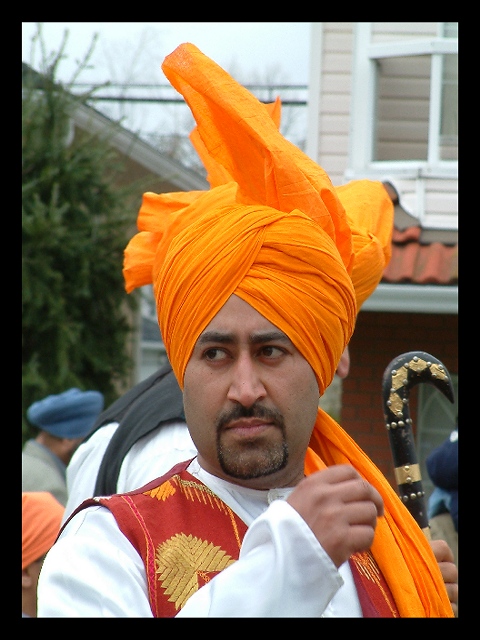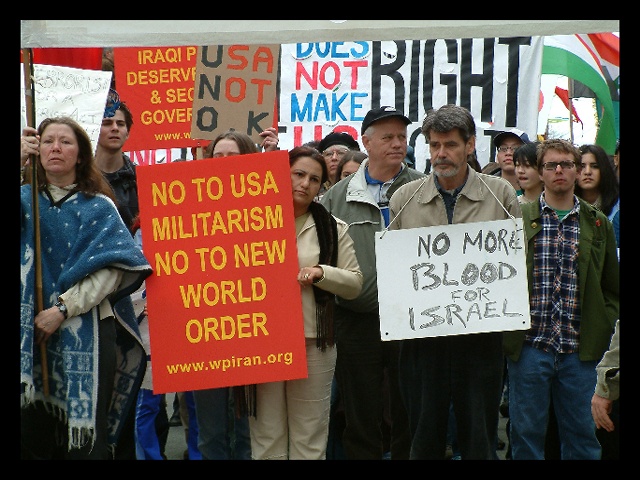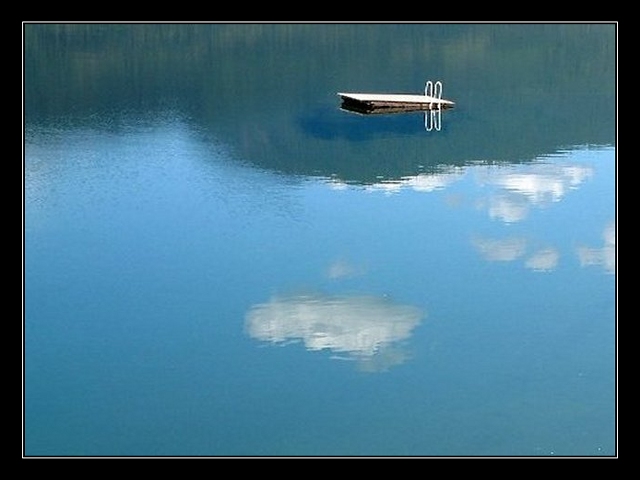Wednesday, April 30, 2003
Memories Are Made of This
Twenty-eight years ago today, the people of Vietnam finally threw off one hundred years of Western colonialist oppression and exploitation when soldiers of the liberating forces captured Saigon. The city was immediately renamed Ho Chi Minh City. Round One of America's attempt to conquer the world was officially over.
This is a good memory to keep in one's mind as Round Two, under Imperial Minister of War Rumsfeld, moves into a higher "first strike" gear.
This is a good memory to keep in one's mind as Round Two, under Imperial Minister of War Rumsfeld, moves into a higher "first strike" gear.
Unnecessary Hiatus
A combination of technology-gone-bad and overwork has kept me away from blogging for a week. I'll try to make up for that!
Monday, April 21, 2003
Sunday, April 20, 2003
The Missing Persons Bureau
I have written earlier about how the multi-billion dollar US "intelligence" services have been totally unable to track down such well-known varmints as Mullar Omar of the Taliban and Osama bin Laden of Al-Qaeda. We also know they haven't managed to find Saddam Hussein either.
What occured to me this morning was that these guys haven't found any trace of Saddam's supposed eight doubles either. That means in Iraq, they are batting 0 for 9!
I think the boys in Langley would do better to hire Jim Rockford or Magnum or Angela Lansbury, perhaps.
What occured to me this morning was that these guys haven't found any trace of Saddam's supposed eight doubles either. That means in Iraq, they are batting 0 for 9!
I think the boys in Langley would do better to hire Jim Rockford or Magnum or Angela Lansbury, perhaps.
Middle-East As A WMD-Free Zone
Last week, the Syrians announced another plan to get the United Nations to declare the Middle East a region entirely free of all weapons of mass destruction. Of course, it will fail because the United States cannot support such a position without abandoning its ally, Israel, the only WMD-rogue nation in the area.
Israel is the only country in the region, and one of the very few countries in the entire world, that refuses to sign the Nuclear Non-Proliferation Treaty. It has at least 100 nuclear weapons poised to destroy any country it feels upsets it enough. The United States could, of course, oblige Israel to give up its WMD weapons, but deliberately chooses not to. The US position is one of hypocrisy of extraordinary proportions.
The idea of a Middle East inspected and free of WMD is not new. There are UN resolutions on the matter dated 9 December 1974, 11 December 1975, 10 December 1976, 12 December 1977, 14 December 1978, 11 December 1979, and 12 December 1980. They all went nowhere because the U.S. didn't want them to. Egypt proposed a similar plan in 1990. Once again. it went nowhere in the face of United States opposition. The 1991 Madrid Peace Conference agreed to set up mechanisms for ensuring a WMD-free zone. But the work on the mechanism collapsed in 1995 in the face of Israel's refusal to cooperate.
In the face of the latest demand, the U.S. position is, yes, we support such a zone -- but only after peace has been secured.
We need to protest this hypocrisy in the loudest way. We need to demand through every possible channel that the Middle East be made into a WMD-free zone as a confidence-building measure to assist in the movement towards a general peace in the region. We need to ask every US politician on every possible occasion whether or not they support such a weapons-free zone; if not, why not? If so, what will they do to support it?
This is a campaign that we, as the people, can force on the politicians if we are consistent in making them feel our pressure. It is a campaign that can work. Start by demanding that YOUR local representative make their position clear on this vital issue. If you are an American, email your Representatives and Senators in Washington and ask them where they stand. If you are not an American, write or call or email your national politicians and demand that they get on board the push for a UN resolution with teeth.
We CAN do this!
Israel is the only country in the region, and one of the very few countries in the entire world, that refuses to sign the Nuclear Non-Proliferation Treaty. It has at least 100 nuclear weapons poised to destroy any country it feels upsets it enough. The United States could, of course, oblige Israel to give up its WMD weapons, but deliberately chooses not to. The US position is one of hypocrisy of extraordinary proportions.
The idea of a Middle East inspected and free of WMD is not new. There are UN resolutions on the matter dated 9 December 1974, 11 December 1975, 10 December 1976, 12 December 1977, 14 December 1978, 11 December 1979, and 12 December 1980. They all went nowhere because the U.S. didn't want them to. Egypt proposed a similar plan in 1990. Once again. it went nowhere in the face of United States opposition. The 1991 Madrid Peace Conference agreed to set up mechanisms for ensuring a WMD-free zone. But the work on the mechanism collapsed in 1995 in the face of Israel's refusal to cooperate.
In the face of the latest demand, the U.S. position is, yes, we support such a zone -- but only after peace has been secured.
We need to protest this hypocrisy in the loudest way. We need to demand through every possible channel that the Middle East be made into a WMD-free zone as a confidence-building measure to assist in the movement towards a general peace in the region. We need to ask every US politician on every possible occasion whether or not they support such a weapons-free zone; if not, why not? If so, what will they do to support it?
This is a campaign that we, as the people, can force on the politicians if we are consistent in making them feel our pressure. It is a campaign that can work. Start by demanding that YOUR local representative make their position clear on this vital issue. If you are an American, email your Representatives and Senators in Washington and ask them where they stand. If you are not an American, write or call or email your national politicians and demand that they get on board the push for a UN resolution with teeth.
We CAN do this!
Saturday, April 19, 2003
Baisakhi Greetings!
Today the Indo-Canadians of Vancouver, and from around British Columbia and northern Washington State, celebrated the major Sikh festival of Baisakhi with a parade and entertainments in the neighbourhood officially called Punjabi Market.
It was wonderful! The parade was great, and households and small companies along the streets gave out quantities of foods -- curries and pakoras and samosas and various chutnies and chana with rice and mixed breads, while smiling turbanned gentlemen served cups of hot chai to anyone who asked. It was a happy day.




By the way, this is now the fourth New Year celebration for me this year. There was the regular calendar one on January 1st; then Chinese New Year in March; then Persian New Year a couple of weeks ago (we have two Iranian ladies in the office and they served us Nowruz cookies); and now the Sikh New Year equivalent.
It was wonderful! The parade was great, and households and small companies along the streets gave out quantities of foods -- curries and pakoras and samosas and various chutnies and chana with rice and mixed breads, while smiling turbanned gentlemen served cups of hot chai to anyone who asked. It was a happy day.




By the way, this is now the fourth New Year celebration for me this year. There was the regular calendar one on January 1st; then Chinese New Year in March; then Persian New Year a couple of weeks ago (we have two Iranian ladies in the office and they served us Nowruz cookies); and now the Sikh New Year equivalent.
Friday, April 18, 2003
Stealing More Land For Industry
While the mainstream media focuses on the Iraqi wrap-up and the huge tax cut proposals, the Republicans are quietly selling the people's property to the highest bidder.
That will be the effect of the US Department of the Interior's decision this week to cancel all future wilderness reviews, and to reclassify millions of acres out of the wilderness reserve. "Wilderness areas, as defined by the 1964 Wilderness Act, are those 'untrammeled by man' and are protected from oil and gas development, off-road use, and various types of construction." Lands not classified as wilderness lose all those protections.
Government -- the capitalists' creature -- once again moves to enhance the interests of its master.
That will be the effect of the US Department of the Interior's decision this week to cancel all future wilderness reviews, and to reclassify millions of acres out of the wilderness reserve. "Wilderness areas, as defined by the 1964 Wilderness Act, are those 'untrammeled by man' and are protected from oil and gas development, off-road use, and various types of construction." Lands not classified as wilderness lose all those protections.
Government -- the capitalists' creature -- once again moves to enhance the interests of its master.
Easter Friday
Vancouver is a most beautiful city. It is regularly declared the first or second best place to live in the world (occasionally a Swiss city will beat us in the voting). For all that, in the heart of the city is the Downtown Eastside, regularly declared the worst inner city drug neighbourhood in North America.
In the middle of Downtown Eastside is the Union Gospel Mission, which every day serves dinner to hundreds of the destitute and addicted, and houses scores of others. On holidays, the Mission is justly famous for the crowds that gather for the free meal, patient lines circling many blocks. My wife volunteers in the kitchen every Friday, and each holiday we both volunteer to serve. Today, for Easter lunch, we helped serve about 2,500 of the city's most desperate, degraded and abused individuals; men, women and far too many children. Each person was served a wonderful meal of ham and vegetables and potatoes, with a bread roll and a drink, finished off with pie and ice cream and coffee. As they left, they each received a goodie bag with candy, and a tote bag that gifted them a whole range of toiletries along with socks and similar useful items.
My job today was to hand out the tote bags, so I got to meet and interact with everyone who went through. It was great to see these people enjoy something for a change, and to receive back from them the gratitude they were happy to express.
Sure, I object to serving Jesus with the meal. But I object more to the poor and destitute not having a hot meal and a few goodies today. In this case, for certain, the ends justify the means and I was very happy to be a part of it.
In the middle of Downtown Eastside is the Union Gospel Mission, which every day serves dinner to hundreds of the destitute and addicted, and houses scores of others. On holidays, the Mission is justly famous for the crowds that gather for the free meal, patient lines circling many blocks. My wife volunteers in the kitchen every Friday, and each holiday we both volunteer to serve. Today, for Easter lunch, we helped serve about 2,500 of the city's most desperate, degraded and abused individuals; men, women and far too many children. Each person was served a wonderful meal of ham and vegetables and potatoes, with a bread roll and a drink, finished off with pie and ice cream and coffee. As they left, they each received a goodie bag with candy, and a tote bag that gifted them a whole range of toiletries along with socks and similar useful items.
My job today was to hand out the tote bags, so I got to meet and interact with everyone who went through. It was great to see these people enjoy something for a change, and to receive back from them the gratitude they were happy to express.
Sure, I object to serving Jesus with the meal. But I object more to the poor and destitute not having a hot meal and a few goodies today. In this case, for certain, the ends justify the means and I was very happy to be a part of it.
Thursday, April 17, 2003
Memories Are Made Of This ....
Forty-two years ago today, the United States tried to invade Cuba on the cheap. A few thousand "patriots" and adventurers, funded and controlled by the CIA, landed at the Bay of Pigs in a futile and sorry bid to overthrow Fidel Castro's regime.
This was just one of the dozens of invasions and interventions with which the United States has brutalised the world since the end of the Second World War. It is a pity that so few othes ended in giving them a bloody nose as Fidel did in 1961.
This was just one of the dozens of invasions and interventions with which the United States has brutalised the world since the end of the Second World War. It is a pity that so few othes ended in giving them a bloody nose as Fidel did in 1961.
Wednesday, April 16, 2003
Syria -- Again
When we last left the story, anti-Syrian rhetoric was riding high in Washington, and an Observer story had supplied the larger context.
However, by the beginning of last weekend, the British were already backing away from the U.S. hawks' position, and by Tuesday, widespread international condemnation had become a roar. The European Union and Kofi Annan urged restraint, while Russia said that the U.S. was aggravating the situation. The Arab League and France, of course, objected to the American rhetoric; that was to be expected. More surprising, perhaps, Jose Maria Aznar, Prime Minister of Spain and Bush's second poodle in the Iraq business, stated categorically that "Syria is and will remain a friend of Spain and will not be the target of any military action."
The noise was so great that the White House felt it prudent to let it be known that Bush had told his boys to cool it. Knowing there would be a credibility problem with statements from Washington, the Administration wheeled out Tony Blair as the "honest injun" to tell the world that the subject of Syria had never come up. Colin Powell, the "respectable" face of the American foreign policy also spent the rest of the week telling anyone foolish enough to listen that there were no plans to attack any other country in the region. One official in London admited that "It's a bit of a good cop, bad cop routine."
And sure enough, there was War Minister Rumsfeld repeating his allegations of chemical weapons tests. And former chief United Nations weapons inspector Richard Butler emerged from oblivion to back US claims that Syria helped conceal Iraqi weapons of mass destruction. Butler said that during 1997, 1998 and 1999 he saw evidence which seemed to indicate Syrian co-operation with Iraq. "We had reason to believe that those were containers of chemical weapons and perhaps some other weapons," he told ABC radio. White House spokesman Ari Fleischer kept up the pressure, saying "the focus is on Syria because Syria is the nation that is harbouring Iraqis." US officials later claimed that Farouk Hijazi -- a director of the Iraqi intelligence agency in the 1990s when it is alleged to have carried out a failed attempt to assassinate the then US President George Bush -- was hiding in Syria.
Syrian foreign ministry spokeswoman Bouthana Shaaban hit back, insisting that "the only country in the region which has chemical, biological and nuclear weapons is Israel". The same line was pursued by Mouafak Nassar in a rad interview with the BBC: "I will say I am wondering why they are targeting one Arab country after the other. They are ignoring totally the country that has mass destruction weapons - Israel." As counter-pressure, Syria is preparing to introduce a resolution at the UN Security Council calling for the Middle East to be declared a "zone free of weapons of mass destruction" - a clear reference to Israel's nuclear weapons programme. Israeli Prime Minister Ariel Sharon, in response, called Syrian President Bashar al-Assad "dangerous", with "impaired judgement", and urged the US to increase pressure on Syria.
Finally, early this morning, the Times of London reported that US Central Command would invade Syria if it learned that Saddam Hussein himself were in the country. They would attempt to justify this further breach of international law and discipline as "hot pursuit."
That all being said, there are rumblings among the cogniscenti in Washington that Bush has been firmly advised to turn away from foreigh adventures and concentrate on domestic prosperity in the run up to the 2004 elections. He is no doubt reminded on a daily basis that his father won Gulf War I and that meant less than nothing when he lost the next election on the issue of the economy. Bush is a cowboy; he wants to "deal with" Syria while the forces are in region, and no doubt Wolfowitz and Perle and the other ultra hawks are whispering "Attack! Attack!" as loudly as they dare. But in the end, I'm now thinking they will put away the weapons for a year or so and try to use economic pressures to beat the Syrian government into compliance.
However, if the Syrians resist and continue to act like a soveriegn nation once Bush is reelected, then for sure the hot lead (or depleted uranium) will fly.
Sources: BBC Online (1), BBC Online (2), BBC Online (3), Guardian (1), Guardian (2), New York Times, Observer, Times of London [do search on "hot pursuit" if story moved]
However, by the beginning of last weekend, the British were already backing away from the U.S. hawks' position, and by Tuesday, widespread international condemnation had become a roar. The European Union and Kofi Annan urged restraint, while Russia said that the U.S. was aggravating the situation. The Arab League and France, of course, objected to the American rhetoric; that was to be expected. More surprising, perhaps, Jose Maria Aznar, Prime Minister of Spain and Bush's second poodle in the Iraq business, stated categorically that "Syria is and will remain a friend of Spain and will not be the target of any military action."
The noise was so great that the White House felt it prudent to let it be known that Bush had told his boys to cool it. Knowing there would be a credibility problem with statements from Washington, the Administration wheeled out Tony Blair as the "honest injun" to tell the world that the subject of Syria had never come up. Colin Powell, the "respectable" face of the American foreign policy also spent the rest of the week telling anyone foolish enough to listen that there were no plans to attack any other country in the region. One official in London admited that "It's a bit of a good cop, bad cop routine."
And sure enough, there was War Minister Rumsfeld repeating his allegations of chemical weapons tests. And former chief United Nations weapons inspector Richard Butler emerged from oblivion to back US claims that Syria helped conceal Iraqi weapons of mass destruction. Butler said that during 1997, 1998 and 1999 he saw evidence which seemed to indicate Syrian co-operation with Iraq. "We had reason to believe that those were containers of chemical weapons and perhaps some other weapons," he told ABC radio. White House spokesman Ari Fleischer kept up the pressure, saying "the focus is on Syria because Syria is the nation that is harbouring Iraqis." US officials later claimed that Farouk Hijazi -- a director of the Iraqi intelligence agency in the 1990s when it is alleged to have carried out a failed attempt to assassinate the then US President George Bush -- was hiding in Syria.
Syrian foreign ministry spokeswoman Bouthana Shaaban hit back, insisting that "the only country in the region which has chemical, biological and nuclear weapons is Israel". The same line was pursued by Mouafak Nassar in a rad interview with the BBC: "I will say I am wondering why they are targeting one Arab country after the other. They are ignoring totally the country that has mass destruction weapons - Israel." As counter-pressure, Syria is preparing to introduce a resolution at the UN Security Council calling for the Middle East to be declared a "zone free of weapons of mass destruction" - a clear reference to Israel's nuclear weapons programme. Israeli Prime Minister Ariel Sharon, in response, called Syrian President Bashar al-Assad "dangerous", with "impaired judgement", and urged the US to increase pressure on Syria.
Finally, early this morning, the Times of London reported that US Central Command would invade Syria if it learned that Saddam Hussein himself were in the country. They would attempt to justify this further breach of international law and discipline as "hot pursuit."
That all being said, there are rumblings among the cogniscenti in Washington that Bush has been firmly advised to turn away from foreigh adventures and concentrate on domestic prosperity in the run up to the 2004 elections. He is no doubt reminded on a daily basis that his father won Gulf War I and that meant less than nothing when he lost the next election on the issue of the economy. Bush is a cowboy; he wants to "deal with" Syria while the forces are in region, and no doubt Wolfowitz and Perle and the other ultra hawks are whispering "Attack! Attack!" as loudly as they dare. But in the end, I'm now thinking they will put away the weapons for a year or so and try to use economic pressures to beat the Syrian government into compliance.
However, if the Syrians resist and continue to act like a soveriegn nation once Bush is reelected, then for sure the hot lead (or depleted uranium) will fly.
Sources: BBC Online (1), BBC Online (2), BBC Online (3), Guardian (1), Guardian (2), New York Times, Observer, Times of London [do search on "hot pursuit" if story moved]
Tuesday, April 15, 2003
Who -- or What -- Is Counting Your Vote?
The latest batch of stories published at Online Journal includes not only my own "Flavours of Empire" but a fascinating article that asks a number of questions that have bothered me for years. In "Voting Machines Violate Constitution", Lynn Landes asks "Who will launch the legal challenge" against these monstrously illegal mechanisms.
The heart of Landes' argument:
It is a well-argued piece. I'm certainly no lawyer, but she convinced me that there is a case to answer.
The heart of Landes' argument:
"Voting machines reflect the action of the machine first and the intent of the voter . . . maybe. When machines are in the voting booth three violations of federal law take place:This has nothing to do with the botched election of 2000 (although she does quote the Supremes in their Bush v Gore ruling to the effect that "[a] legal vote is one in which there is a 'clear indication of the intent of the voter'.") but, rather, the intrinsic problems that "invisible" and unverifiable voting software can cause.
1. inability to observe if voting machines properly register votes
2. inability to observe if voting machines properly count votes
3. inability to enforce the Voting Rights Act, because of the inability to observe if voting machines are properly registering or counting votes."
It is a well-argued piece. I'm certainly no lawyer, but she convinced me that there is a case to answer.
Monday, April 14, 2003
Syria in The Batter's Circle
Bashar al-Assad, not-so-firmly-fixed dynastic leader of Syria, must be wondering how to dodge the headlights that the Empire is turning on him and his regime. Israel has long desired a change of regime in Damascus and the circumstances of the Iraqi War seems to offer an opportunity. It would, of course, be an outrageous slap in the face of international law and general morality for the Empire to invade Syria at this time; but so what? Who will stop them? The choreography of escalation has been fascinating.
Throughout the recent invasion of Iraq, there were grumblings that Syria was supplying equipment -- night-vision goggles seemed to be the main irritant -- to Saddam Hussein's military, a trade that Syria has consistently denied. On Wednesday last, Imperial Minister of War Rumsfeld warned Syria against helping members of Saddam's regime escape from Iraq. There were, he claimed "scraps of intelligence saying that Syria has been co-operative in facilitating the move of the people out of Iraq and into Syria". Rumsfeld said that "No one has thrown down the gauntlet." But, suggested the New York Times, he sounded like a man who was preparing to do so.
Damascus ignored the provocative accusations, noting through a statement on State-run radio that Syria "was not, at any time, backing anyone but the Iraqi people," and calling for "the international community to make every effort to put an end to the occupation [of Iraq]."
By Thursday, Rumsfeld's Deputy Paul Wolfowitz was raising the ante, accusing Syria of "shipping killers into Iraq to try to kill Americans." He added: 'We need to think about what our policy is towards a country that harbours terrorists or harbours war criminals. 'There will have to be change in Syria, plainly."
On Friday, Bush lent his weight to the pressure in remarks to the media. "Syria just needs to know we expect full co-operation and that we strongly urge them not to allow for Baath Party members or Saddam's families or generals on the run to find safe haven there," Bush said. This was a mesaage repeated by Colin Powell on a TV show in London early on Saturday morning. Richard Perle, chief architect of the invade Iraq strategy, added a new wrinkle. Perle warned that the US would be compelled to act against Syria if it emerged that "weapons of mass destruction" had been moved there by Saddam's regime. Other officials alleged that Syria had a decades long chemical warfare program.
Later on Saturday, Syria hit back. At a joint press conference with the French Foreign Minister, the Syrian Foreign Minister Farouk al-Sharaa denied all the American charges; and levied accusations of his own. He said the charges against Syria were just a cover for America's failure to suppress riots and looting in Iraq. "Had the aim of the war been changing the regime in Iraq, we wouldn't have been seeing the suffering we are witnessing now of looting and theft in Iraqi cities," Mr al-Sharaa said. America's aim was "to destroy Iraq's institutions, ministries and infrastructure that exist in all countries over the world and have nothing to do with the regime". On Sunday, Imad Moustapha, the deputy ambassador in Washington, went on American TV with the same denials. On the question of chemical weapons, he was adamant. "We will not only accept the most rigid inspection regime, we will welcome it heartily."
During the weekend, Britain made haste to back off any suggestion that it supported an attack on Syria. On a tour of Bahrain, the British Foreign Secretary Jack Straw insisted that there was no "next list" and distanced himself from the claims that Syria had WMD. Tony Blair also took the opportunity to tell the world that there were "no plans whatsoever to invade Syria". Defence Minister Hoon repeated this on Monday. But Sir Andrew Green, British Ambassador to Syria between 1991 and 1994, said that while he hoped there would be a "much more measured approach" towards Syria, there were some "wild people in Washington."
By this weekend, academia was also weighing in on the pros and cons of an assault on Syria. In a brief article for UPI, Alon Ben-Meir, Middle East Project Director at the World Policy Institute, New York, and a professor of International Relations at New York University, suggested that attacking Syria would be entirely the wrong policy. He suggests that Bush take the "bold" initiative of working with Syria, removing them from the State Departrment's restricted list as a reward for their cooperation and holding out the possibility of recovering the Golan. This reasonableness seems lost in the noise of war and glory.
One of Sir Andrew Green's "wild people", Donald Rumsfeld, was keeping up the hard charge. Accusing the Syrians of allowing "busloads" of Syrian mercenaries to drive into Iraq and join Iraqi paramilitaries in fighting Americans, Rumsfeld said, "The [Syrian] government is making a lot of bad mistakes, a lot of bad judgments in my view." He was joined on Monday by Powell who suggested that sanctions might be in order. "We will examine possible measures of a diplomatic, economic or other nature as we move forward," he said. And by the supercillious Ari Fleischer:
Thus, we have the important elements that went to make up the public rationale for the attack on Iraq -- support for terrorism and weapons of mass destruction. The opportunity exists, with so much U.S. firepower already in theatre. And there is a reason: This past Sunday, the Observer in London published an article that clearly placed an attack on Syria into the Israeli context.
Sources:
BBC Online (1); BBC Online (2); BBC Online (3); BBC Online (4); BBC Online (5); CNN; Guardian Unlimited; New York Times (1); New York Times (2); New York Times (3); Observer; UPI
Throughout the recent invasion of Iraq, there were grumblings that Syria was supplying equipment -- night-vision goggles seemed to be the main irritant -- to Saddam Hussein's military, a trade that Syria has consistently denied. On Wednesday last, Imperial Minister of War Rumsfeld warned Syria against helping members of Saddam's regime escape from Iraq. There were, he claimed "scraps of intelligence saying that Syria has been co-operative in facilitating the move of the people out of Iraq and into Syria". Rumsfeld said that "No one has thrown down the gauntlet." But, suggested the New York Times, he sounded like a man who was preparing to do so.
Damascus ignored the provocative accusations, noting through a statement on State-run radio that Syria "was not, at any time, backing anyone but the Iraqi people," and calling for "the international community to make every effort to put an end to the occupation [of Iraq]."
By Thursday, Rumsfeld's Deputy Paul Wolfowitz was raising the ante, accusing Syria of "shipping killers into Iraq to try to kill Americans." He added: 'We need to think about what our policy is towards a country that harbours terrorists or harbours war criminals. 'There will have to be change in Syria, plainly."
On Friday, Bush lent his weight to the pressure in remarks to the media. "Syria just needs to know we expect full co-operation and that we strongly urge them not to allow for Baath Party members or Saddam's families or generals on the run to find safe haven there," Bush said. This was a mesaage repeated by Colin Powell on a TV show in London early on Saturday morning. Richard Perle, chief architect of the invade Iraq strategy, added a new wrinkle. Perle warned that the US would be compelled to act against Syria if it emerged that "weapons of mass destruction" had been moved there by Saddam's regime. Other officials alleged that Syria had a decades long chemical warfare program.
Later on Saturday, Syria hit back. At a joint press conference with the French Foreign Minister, the Syrian Foreign Minister Farouk al-Sharaa denied all the American charges; and levied accusations of his own. He said the charges against Syria were just a cover for America's failure to suppress riots and looting in Iraq. "Had the aim of the war been changing the regime in Iraq, we wouldn't have been seeing the suffering we are witnessing now of looting and theft in Iraqi cities," Mr al-Sharaa said. America's aim was "to destroy Iraq's institutions, ministries and infrastructure that exist in all countries over the world and have nothing to do with the regime". On Sunday, Imad Moustapha, the deputy ambassador in Washington, went on American TV with the same denials. On the question of chemical weapons, he was adamant. "We will not only accept the most rigid inspection regime, we will welcome it heartily."
During the weekend, Britain made haste to back off any suggestion that it supported an attack on Syria. On a tour of Bahrain, the British Foreign Secretary Jack Straw insisted that there was no "next list" and distanced himself from the claims that Syria had WMD. Tony Blair also took the opportunity to tell the world that there were "no plans whatsoever to invade Syria". Defence Minister Hoon repeated this on Monday. But Sir Andrew Green, British Ambassador to Syria between 1991 and 1994, said that while he hoped there would be a "much more measured approach" towards Syria, there were some "wild people in Washington."
By this weekend, academia was also weighing in on the pros and cons of an assault on Syria. In a brief article for UPI, Alon Ben-Meir, Middle East Project Director at the World Policy Institute, New York, and a professor of International Relations at New York University, suggested that attacking Syria would be entirely the wrong policy. He suggests that Bush take the "bold" initiative of working with Syria, removing them from the State Departrment's restricted list as a reward for their cooperation and holding out the possibility of recovering the Golan. This reasonableness seems lost in the noise of war and glory.
One of Sir Andrew Green's "wild people", Donald Rumsfeld, was keeping up the hard charge. Accusing the Syrians of allowing "busloads" of Syrian mercenaries to drive into Iraq and join Iraqi paramilitaries in fighting Americans, Rumsfeld said, "The [Syrian] government is making a lot of bad mistakes, a lot of bad judgments in my view." He was joined on Monday by Powell who suggested that sanctions might be in order. "We will examine possible measures of a diplomatic, economic or other nature as we move forward," he said. And by the supercillious Ari Fleischer:
""This is a day of emerging liberation for the people of Iraq and it's important for President (Bashar) Assad of Syria, who is a new leader, a young man, to understand that the future needs to be different from the past and that the Iraqi people deserve no less, the region deserves no less."Both Rumsfeld and Fleischer played hard on the chemical weapons card that seems to play so well to American audiences. They both quoted a CIA report made public last year that concluded that Syria "already held nerve gas ... but is trying to develop more toxic and persistent nerve agents."
Thus, we have the important elements that went to make up the public rationale for the attack on Iraq -- support for terrorism and weapons of mass destruction. The opportunity exists, with so much U.S. firepower already in theatre. And there is a reason: This past Sunday, the Observer in London published an article that clearly placed an attack on Syria into the Israeli context.
"The new US undertaking to Israel to deal with Hizbollah via its Syrian sponsors has been made over recent days during meetings between administration officials and Israeli diplomats in Washington, and Americans talking to Israeli Prime Minister Ariel Sharon in Jerusalem. It would be part of a deal designed to entice Israel into the so-called road map to peace package that would involve the Jewish state pulling out of the Palestinian West Bank, occupied since 1967.I wouldn't give you a penny for Syria's chances in the short to medium term.
Prime Minister Ariel Sharon has so far rejected the road map initiative - charted by the US with its ally, Britain - which also calls for mutual recognition between Israel and a new Palestinian state, structured according to US-backed reforms. The American guarantee would be to take armed action if necessary to cut off Syrian support for Hizbollah, and stop further sponsorship for the group by Iran.
Sources:
BBC Online (1); BBC Online (2); BBC Online (3); BBC Online (4); BBC Online (5); CNN; Guardian Unlimited; New York Times (1); New York Times (2); New York Times (3); Observer; UPI
Why The Americans Hope Saddam Is Dead
The U.S. Administration was very keen to kill Saddam Hussein during the recent unpleasantness; you will recall that they made at least two "surgical strikes" aimed specifically at Saddam. Very few people in the world yet know whether they succeeded or not, although we do know a dozen or more Iraqi civilians paid the ultimate price of US arrogance. Why was Saddam's death needed so badly?
It has been known for a long time that Saddam had been a CIA creature, financed and armed by the United States. But recent research by UPI has uncovered a much longer working collaboration than most people would be aware of, and much more extensive use of US assistance during Saddam's war against Iran. It seems likely, therefore, that Saddam cannot be allowed to survive to testify about this relationship.
It has been known for a long time that Saddam had been a CIA creature, financed and armed by the United States. But recent research by UPI has uncovered a much longer working collaboration than most people would be aware of, and much more extensive use of US assistance during Saddam's war against Iran. It seems likely, therefore, that Saddam cannot be allowed to survive to testify about this relationship.
Sunday, April 13, 2003
The Orangutan Foundation
Just once in a while we have to stop all our murmurings and remember what's really important.

The Orangutan Foundation link on the lefthand side of this page is the longest-lasting link on this site. They continue to need our help as they perform their vital work. Take a moment to visit their web-page, get acquainted with thier work, and donate what you can.

The Orangutan Foundation link on the lefthand side of this page is the longest-lasting link on this site. They continue to need our help as they perform their vital work. Take a moment to visit their web-page, get acquainted with thier work, and donate what you can.
Easing The Way To The Trough
One of the few "controls" in place over the military-industrial complex is the requirement that government contracts valued at greater than $7.5 million have to go for competitive bidding and the winners have to accept a certain minimal level of public accountability. The Republican's chief bagman, Rep. Tom Davis of Virginia, wants to put a stop to all that accountability and transperancy nonsense by raising the limit to $200 million!
Tom Davis and his ilk claim that the defence contractors are already kept in line by the competitive pressures of the open market. But, as influential critics point out, what genuine open market is there for, say, a $150 million fighter aircraft, or a $100 million minesweeper? What can be behind Davis' draft legislation?
Tom Davis and his ilk claim that the defence contractors are already kept in line by the competitive pressures of the open market. But, as influential critics point out, what genuine open market is there for, say, a $150 million fighter aircraft, or a $100 million minesweeper? What can be behind Davis' draft legislation?
"Two year ago in a letter to Congress, a defense industry coalition advocated legislation almost identical to the current draft of Davis' yet-to-be introduced bill.As Danielle Brian, executive director of the nonpartisan Project on Government Oversight, says, Davis' procurement proposals "continue to be the catchall `let's give the contractors what they want to rip off the taxpayers."
Davis' northern Virginia congressional district is near the Pentagon and encompasses Washington suburbs housing numerous government contractors including firms in the high-tech industry, where Davis worked before coming to Congress. Davis' background helped him as chairman of the National Republican Congressional Committee, which doubled its fund raising from $72 million in 1997-98 to $141 million in 2001-02. Davis' own campaign received over $70,000 in donations from employees of computer equipment and services companies and $60,000 from defense contractors in 2001-02."
Saturday, April 12, 2003
International Day of Protest -- Vancouver
Another great turnout today for the protests against the American Empire. These are images from the March.








Flavours of Empire
There is a clear recognition today that the United States of America has now formally moved into the position of “empire”. The only question now seems to be what kind of empire it will be. The answer to this question is tightly linked to the immediate future of Iraq and the Middle East. There is, of course, no shortage of opinions.
In “Democratic Imperialism: A Blueprint”, Stanley Kurtz appears to agree with Paul Wolfowitz, Richard Perle and Bernard Lewis, “voices within the administration” who have argued that “only a democratic transformation of Iraq, and eventually of the larger Arab world, can provide long-term security against terrorism and nuclear attack.” [emphasis added] Kurtz notes that Bush officially jumped on this bandwagon in February during a speech in which the president declared that “the world has a clear interest in the spread of democratic values.” Kurtz, in fact, puts the issue in almost apocalyptic terms:
Kurtz rehearses the well-known history of British policy in India during the nineteenth century, a policy that swung like a pendulum between Edmund Burke’s “Orientalist” school of governance, which was “conservative, respectful of indigenous practices and elites, and insistent on the highest standards of stewardship,” and the administrators schooled by James Mill and his son John Stuart Mill who were “skeptical, even contemptuous, of traditional practices and elites” and who were “determined to force a democratic social transformation.” In the end, of course, under the younger Mill and after, a mixed system prevailed in which indigenous elites were co-opted to “rule”, while a “small but influential bureaucratic class of Anglicized Indians” – the fruit of the older Mills’ work -- actually managed the country. Kurtz notes that it was pressure in the twentieth century precisely from this educated civil service class, prohibited from the higher administrative levels because of British racism and Indian caste elitism, that led, eventually, to the birth of Indian democracy and independence from both colonials and princes.
But this all took a long time -- “The lesson in all this is that a slow process of English-medium education in modern and liberal ideas has the potential to transform a traditional non-Western society into a modern democracy” – but time and patience are not long suits in the American arsenal. However, noting that the educated class in India made up only one or two percent of the population and yet was sufficient “to manage a modern democracy and slowly transmit modern and liberal ideas to the larger populace”, Kurtz suggests that in Iraq it might take only “the time it takes to educate a single generation.”
Kurtz argues that, even with all the returning immigrants, “substantial American or Western involvement in the administration and staffing of a reconstructed Iraq will almost certainly be essential to any hoped for democratic transformation. The question is,” he says, “can that kind of intimate American involvement take place under the umbrella of an Iraqi government?”
At least in the short term, Kurtz answers this with a definite “no!”. He argues, using the younger Mill as his model, that a period of imperialist despotism will be required in Iraq (and by implication in future takeovers) before “democratic” structures can be usefully employed.
Taking his terms of definition from Isaiah Berlin, Kruger prays for the defeat of the “foxes” – those who are “sophisticated, pluralist” and who believe in “multicuturalism and the ‘post modern’ world order … negotiation, containment and compromise” – and loudly cheers on the victory of the “hedgehogs”, who are shrilly proud to be “anti-intellectual, single minded, often religious, and comfortable with certainties, chief among which are ‘good’ and ‘evil’.” The hedgehog philosophy is “driven by the firm belief – uncluttered by relativist self-loathing – in the universal principles of liberty and justice.”
Proud to be dumb and bigoted, I’d call it.
Kruger calls the Iraqi War “a parting of the ways” between the foxes (among whom he includes France, Germany, Belgium and “a handful of malcontents including China and Russia”) and the hedgehogs. About the war, he says
In a recent article in “The Chronicle Review”, Niall Ferguson also argues that it is time for the United States to move away from imperial denial, to make the shift “from informal to formal empire.” Like many before him, he states the obvious fact that America has already had an “empire” for some time, exercising its power through the “soft” measures of “economical and cultural agencies.” The shift to formal empire will involve the “hard” business of actually running a colony, like Iraq. It is hard, I say, because the imposition of alien systems is so unnatural.
Ferguson asks how western democratic-capitalism became so widespread across the globe? To which I would add the rider: “Is western democratic-capitalism so universally and obviously superior that it sprang up indigenously in all these places?” Ferguson has the answer to both questions:
Resistance IS a requirement.
In “Democratic Imperialism: A Blueprint”, Stanley Kurtz appears to agree with Paul Wolfowitz, Richard Perle and Bernard Lewis, “voices within the administration” who have argued that “only a democratic transformation of Iraq, and eventually of the larger Arab world, can provide long-term security against terrorism and nuclear attack.” [emphasis added] Kurtz notes that Bush officially jumped on this bandwagon in February during a speech in which the president declared that “the world has a clear interest in the spread of democratic values.” Kurtz, in fact, puts the issue in almost apocalyptic terms:
”The dual advent of nuclear proliferation and terrorism has made the creation of an authentic democratic culture in the Arab world essential to the survival of the west.” [emphasis added]Kurtz argues that both the moral and practical questions surrounding the imposition of western values and systems on non-Western societies have already been asked and answered during the British experience in India. He further argues that the Raj is a better example for the US to follow in Iraq than the at-a-glance more obviously similar military occupation and democratization of Japan after the Second World War. His assumptions in regard to this latter case rest on his assertion that there had been “a long Japanese history of experimentation with government along Western and democratic lines”, along with its cultural homogeneity. He compares this to Iraq’s “ethno-religious factionalism” and lack of any kind of democratic tradition.
Kurtz rehearses the well-known history of British policy in India during the nineteenth century, a policy that swung like a pendulum between Edmund Burke’s “Orientalist” school of governance, which was “conservative, respectful of indigenous practices and elites, and insistent on the highest standards of stewardship,” and the administrators schooled by James Mill and his son John Stuart Mill who were “skeptical, even contemptuous, of traditional practices and elites” and who were “determined to force a democratic social transformation.” In the end, of course, under the younger Mill and after, a mixed system prevailed in which indigenous elites were co-opted to “rule”, while a “small but influential bureaucratic class of Anglicized Indians” – the fruit of the older Mills’ work -- actually managed the country. Kurtz notes that it was pressure in the twentieth century precisely from this educated civil service class, prohibited from the higher administrative levels because of British racism and Indian caste elitism, that led, eventually, to the birth of Indian democracy and independence from both colonials and princes.
But this all took a long time -- “The lesson in all this is that a slow process of English-medium education in modern and liberal ideas has the potential to transform a traditional non-Western society into a modern democracy” – but time and patience are not long suits in the American arsenal. However, noting that the educated class in India made up only one or two percent of the population and yet was sufficient “to manage a modern democracy and slowly transmit modern and liberal ideas to the larger populace”, Kurtz suggests that in Iraq it might take only “the time it takes to educate a single generation.”
Kurtz argues that, even with all the returning immigrants, “substantial American or Western involvement in the administration and staffing of a reconstructed Iraq will almost certainly be essential to any hoped for democratic transformation. The question is,” he says, “can that kind of intimate American involvement take place under the umbrella of an Iraqi government?”
At least in the short term, Kurtz answers this with a definite “no!”. He argues, using the younger Mill as his model, that a period of imperialist despotism will be required in Iraq (and by implication in future takeovers) before “democratic” structures can be usefully employed.
“Holding democratic elections in a fundamentally illiberal environment invites ethnic conflict, Islamist or secular dictatorship, and the same rounds of military coups that eventually brought Saddam Hussein himself to power … Western economic and political habits are not simply waiting to be unleashed by a few simple legal reforms. The real barrier to modernity in the non-Western world lies in the pervasive and recalcitrant structures of everyday life … an extended American occupation of Iraq is a just policy.”Bizarrely, Kurtz claims that “American rule in Iraq would be relatively free of the racial and cultural bigotry that so marred British rule in India.” America, the land of historically entrenched racism and cultural bigotry, has shown since 9/11 how badly it handles cultural diversity. Less bizarre (but only because we have heard it spouted so often), Kurtz, like Bush and Cheney and Perle and the others, assume that Western economic and political structures are equivalent to “modernity” (i.e., good), while traditional structures are “barriers” and “recalcitrant” (bad). This is stated a lot more baldly by Daniel Kruger in a Spectator article in which he justifies the “Case for Colonialism” because of the “essential rightness of the Judaeo-Christian tradition and the Anglo-Saxon political model.”
Taking his terms of definition from Isaiah Berlin, Kruger prays for the defeat of the “foxes” – those who are “sophisticated, pluralist” and who believe in “multicuturalism and the ‘post modern’ world order … negotiation, containment and compromise” – and loudly cheers on the victory of the “hedgehogs”, who are shrilly proud to be “anti-intellectual, single minded, often religious, and comfortable with certainties, chief among which are ‘good’ and ‘evil’.” The hedgehog philosophy is “driven by the firm belief – uncluttered by relativist self-loathing – in the universal principles of liberty and justice.”
Proud to be dumb and bigoted, I’d call it.
Kruger calls the Iraqi War “a parting of the ways” between the foxes (among whom he includes France, Germany, Belgium and “a handful of malcontents including China and Russia”) and the hedgehogs. About the war, he says
”If it goes well, the 1990s myth of a post-modern order – beyond power, beyond war – will be finished. The day of the hedgehog will dawn.”And finished, too, no doubt, will be all of us who don’t happen to share Mr Kruger’s (or Bush’s) definitions of “liberty” and “justice.” Because the hedgehogs, in their own minds, are by definition right, we must be wrong and will have to be swept from existence. This will take some time, and Kruger lobbies for American colonialism to stay in place until “liberty” takes root.
In a recent article in “The Chronicle Review”, Niall Ferguson also argues that it is time for the United States to move away from imperial denial, to make the shift “from informal to formal empire.” Like many before him, he states the obvious fact that America has already had an “empire” for some time, exercising its power through the “soft” measures of “economical and cultural agencies.” The shift to formal empire will involve the “hard” business of actually running a colony, like Iraq. It is hard, I say, because the imposition of alien systems is so unnatural.
Ferguson asks how western democratic-capitalism became so widespread across the globe? To which I would add the rider: “Is western democratic-capitalism so universally and obviously superior that it sprang up indigenously in all these places?” Ferguson has the answer to both questions:
”In a few rare cases – the most obvious being that of Japan – there was a conscious, voluntary imitation. But more often than not, European institutions were imposed by main force, often literally at gunpoint. In theory, globalization may be possible in an international system of multilateral cooperation. But it may equally well be possible as a result of coercion.”Ferguson's point is that America should grab the challenge and go out and meet it, by imposing its values on "recalcitrant" and "backward" nations under the threat of overwhelming military duress. My point, using the same data, is that bullying is bullying whatever fine words and theories you want to weave around it; and global conformity can only come about by force because it is unnatural and unwanted by those outside the elites.
Resistance IS a requirement.
Friday, April 11, 2003
Thursday, April 10, 2003
The Gaps In Our Lives
Much of my life has been lived in the shadow of several important -- and generally phony -- gaps.
Back in the fifties, there was the entirely spurious "Missile Gap". This was the deliberately false estimate that the Soviet Union was pulling ahead of the United States in terms of weapon tonnage and ability. It was fostered by exactly the same forces that rule North American life today: the military-industrial complex that wants to feed off ever larger chunks of the people's money; and the anti-libertarian far-right establishment who seek a form of totalitarian conformity.
In the mid-sixties, we worked our way through the Credibility Gap. The public's utter disbelief in the rosy portraits painted by the White House of the situation in Vietnam eventually cost Johnson his job.
Throughout the fifties (James Dean), the sixties (hippies), the seventies (punk) and on, there has been a steady stream of "Generation Gaps" that is apparently still continuing apace.
Now, I would like to propose, we live in the age of the swiftly widening Information Gap. By this I mean to suggest that the amount of information the governments of the world require their citizens to supply to them (often, today, in the name of "security against terrorism") is rapidly increasing. At the same time (and for the same alleged reasons) the amount of information the governments are willing to share with the people is rapidly decreasing. The gap between what we have to give and what they are willing to share is already as broad as the Mississippi in full flood, and getting wider with each new piece of legislation.
My advice -- Lie as often and as creatively as possible on all government forms; make rude gestures to video surveillance cameras; use as many "suspicious" words (bomb, marijuana, Bush is a creep, Islam, plot, bin, etc etc) as possible on the telephone and in emails; fill out at least two Freedom of Information requests every week and mail them in. Swamp them in their own security morass.
Resistance IS a requirement.
Back in the fifties, there was the entirely spurious "Missile Gap". This was the deliberately false estimate that the Soviet Union was pulling ahead of the United States in terms of weapon tonnage and ability. It was fostered by exactly the same forces that rule North American life today: the military-industrial complex that wants to feed off ever larger chunks of the people's money; and the anti-libertarian far-right establishment who seek a form of totalitarian conformity.
In the mid-sixties, we worked our way through the Credibility Gap. The public's utter disbelief in the rosy portraits painted by the White House of the situation in Vietnam eventually cost Johnson his job.
Throughout the fifties (James Dean), the sixties (hippies), the seventies (punk) and on, there has been a steady stream of "Generation Gaps" that is apparently still continuing apace.
Now, I would like to propose, we live in the age of the swiftly widening Information Gap. By this I mean to suggest that the amount of information the governments of the world require their citizens to supply to them (often, today, in the name of "security against terrorism") is rapidly increasing. At the same time (and for the same alleged reasons) the amount of information the governments are willing to share with the people is rapidly decreasing. The gap between what we have to give and what they are willing to share is already as broad as the Mississippi in full flood, and getting wider with each new piece of legislation.
My advice -- Lie as often and as creatively as possible on all government forms; make rude gestures to video surveillance cameras; use as many "suspicious" words (bomb, marijuana, Bush is a creep, Islam, plot, bin, etc etc) as possible on the telephone and in emails; fill out at least two Freedom of Information requests every week and mail them in. Swamp them in their own security morass.
Resistance IS a requirement.
Tariq Ali Speaks
As mentioned earlier, Tariq Ali gave a speech in Vancouver on Tuesday evening. Both Tariq and his message were well received by the polite well-scrubbed audience that packed St Andrew’s Wesleyan.
He began by reminding us all that the Afghanistan War has failed in all three of its publicly announced goals – the death or capture of Osama bin Laden; the death or capture of Muhammed Omar; and the utter destruction of the Taliban. Both bin Laden and Omar remain at large (making the multi-billion dollar American intelligence agencies look like idiots in the process), while the Taliban have begun a quiet comeback.
Tariq also asked us to look at the case of “plucky” Kuwait, another failure a dozen years after a war with Iraq was fought to free it “for democracy”. As a recent author puts it: “Despite the success radiated by Kuwait’s economic wealth and liberal attitudes, political life remains surprisingly undemocratic and its human rights record is still a cause for great concern. “
His point, of course, is that wars rarely achieve what they set out to do, and often cause greater calamaties than those they are purportedly started to solve.
Tariq moved swiftly on to what he considers the three reasons for this war. First, it is because the imperial power has resource needs. This is not, he claims, a war against Islam; it is simply that Islam happens to share a geographic location with oil. Second, he suggests, the war is driven by the power-political needs of Israel in the region (as an aside, he noted that the model for the rebuilt Republican Party is Israel’s Likud; Tariq describes it as the Likudization of American politics). Third, the new imperial lion needs to roar and demonstrate its power to those who might challenge it in the future.
While challenging the Americans for imperialist thinking leading to mistaken actions, Tariq’s most strenuous condemnation was left for the Arab regimes who have failed to stand up to American expansionism. Their actions have been non-existent and even their protests have been weak and spoken in a whisper. He received one of the loudest applauses of the evening when he declaimed his appreciation that the people of Iraq, without the support of other regimes, without the backing of the Arab League, had resisted the American invasion for so long.
Just as strongly he condemned the governments of western Europe, France and Germany in particular, for opposing the war in public but who were, quietly, complicit in the invasion by their acceptance that their air space and bases could be used as part of the war machine, and, once the shooting actually started, by wishing the Americans a quick victory. For those governments that actually supported the war – Aznar’s in Spain and Blair’s in the UK – Tariq predicted electoral devastation in the next electoral round.
Tariq noted that, in his opinion, the “people” recognize that this Iraq War is different from warfare in the past, even the recent past. The “people”, he says, recognize this as the opening salvo in a new imperialism and that is why so many have been willing to come out and protest, often for the first time in their lives. He was particularly gratified to see the hundreds of thousands of school children joining the protests. In their hearts, he says, the general populace understands that war – in the guise of “selective vigilantism” -- is now simply another tactic of neo-liberal economics. He predicts early and strong mass movements to remove the American military from some of the 120 countries within which they currently operate.
As a good big-“S” Socialist, Tariq stressed the need for the current mass movements to become “political”. He noted his belief that the 138 Labour Party members who voted against Blair’s war were driven to that position by the sheer scale of the public demonstrations (in England, at least, they were the largest mass protests since before the Second World War) and he urged the audience to keep up the good fight.
Tariq Ali is a fine speaker, articulate and smooth in his argumentation. Obviously an anarchist like me cannot agree to hijacking the anti-war protests to a particular Party’s discipline (no matter the particular shade of Marxist-Leninism that is on offer). As some of my previous writings may have indicated, I also don’t agree with the Israel-leading-American-policy-by-the-nose scenario that Tariq – with his Palestinian-oriented focus -- stresses. But he made some good points in an interesting manner, and I was glad to have heard him.
****
A propos of nothing else in particular, in her introduction to Tariq, the moderator mentioned that he was working on an opera about the Ayatollah Khomeini. Now that’ll be something!
He began by reminding us all that the Afghanistan War has failed in all three of its publicly announced goals – the death or capture of Osama bin Laden; the death or capture of Muhammed Omar; and the utter destruction of the Taliban. Both bin Laden and Omar remain at large (making the multi-billion dollar American intelligence agencies look like idiots in the process), while the Taliban have begun a quiet comeback.
Tariq also asked us to look at the case of “plucky” Kuwait, another failure a dozen years after a war with Iraq was fought to free it “for democracy”. As a recent author puts it: “Despite the success radiated by Kuwait’s economic wealth and liberal attitudes, political life remains surprisingly undemocratic and its human rights record is still a cause for great concern. “
His point, of course, is that wars rarely achieve what they set out to do, and often cause greater calamaties than those they are purportedly started to solve.
Tariq moved swiftly on to what he considers the three reasons for this war. First, it is because the imperial power has resource needs. This is not, he claims, a war against Islam; it is simply that Islam happens to share a geographic location with oil. Second, he suggests, the war is driven by the power-political needs of Israel in the region (as an aside, he noted that the model for the rebuilt Republican Party is Israel’s Likud; Tariq describes it as the Likudization of American politics). Third, the new imperial lion needs to roar and demonstrate its power to those who might challenge it in the future.
While challenging the Americans for imperialist thinking leading to mistaken actions, Tariq’s most strenuous condemnation was left for the Arab regimes who have failed to stand up to American expansionism. Their actions have been non-existent and even their protests have been weak and spoken in a whisper. He received one of the loudest applauses of the evening when he declaimed his appreciation that the people of Iraq, without the support of other regimes, without the backing of the Arab League, had resisted the American invasion for so long.
Just as strongly he condemned the governments of western Europe, France and Germany in particular, for opposing the war in public but who were, quietly, complicit in the invasion by their acceptance that their air space and bases could be used as part of the war machine, and, once the shooting actually started, by wishing the Americans a quick victory. For those governments that actually supported the war – Aznar’s in Spain and Blair’s in the UK – Tariq predicted electoral devastation in the next electoral round.
Tariq noted that, in his opinion, the “people” recognize that this Iraq War is different from warfare in the past, even the recent past. The “people”, he says, recognize this as the opening salvo in a new imperialism and that is why so many have been willing to come out and protest, often for the first time in their lives. He was particularly gratified to see the hundreds of thousands of school children joining the protests. In their hearts, he says, the general populace understands that war – in the guise of “selective vigilantism” -- is now simply another tactic of neo-liberal economics. He predicts early and strong mass movements to remove the American military from some of the 120 countries within which they currently operate.
As a good big-“S” Socialist, Tariq stressed the need for the current mass movements to become “political”. He noted his belief that the 138 Labour Party members who voted against Blair’s war were driven to that position by the sheer scale of the public demonstrations (in England, at least, they were the largest mass protests since before the Second World War) and he urged the audience to keep up the good fight.
Tariq Ali is a fine speaker, articulate and smooth in his argumentation. Obviously an anarchist like me cannot agree to hijacking the anti-war protests to a particular Party’s discipline (no matter the particular shade of Marxist-Leninism that is on offer). As some of my previous writings may have indicated, I also don’t agree with the Israel-leading-American-policy-by-the-nose scenario that Tariq – with his Palestinian-oriented focus -- stresses. But he made some good points in an interesting manner, and I was glad to have heard him.
****
A propos of nothing else in particular, in her introduction to Tariq, the moderator mentioned that he was working on an opera about the Ayatollah Khomeini. Now that’ll be something!
Wednesday, April 09, 2003
Passionate for Peace -- George McGovern Speaks Out
"Thanks to the most crudely partisan decision in the history of the Supreme Court, the nation has been given a President of painfully limited wisdom and compassion and lacking any sense of the nation's true greatness. Appearing to enjoy his role as Commander in Chief of the armed forces above all other functions of his office, and unchecked by a seemingly timid Congress, a compliant Supreme Court, a largely subservient press and a corrupt corporate plutocracy, George W. Bush has set the nation on a course for one-man rule.That is the opening to an emotionally powerful essay by George McGovern in The Nation. McGovern argues against Bush's appropriation of God, and explicitly compares the Bush-Cheney-Rumsfeld plans of today to the disasters in Vietnam-Laos-Cambodia and the madness of preemptive strikes during the Cold War of yesterday. It is a passionate liberal's plea for peace.
He treads carelessly on the Bill of Rights, the United Nations and international law while creating a costly but largely useless new federal bureaucracy loosely called "Homeland Security." Meanwhile, such fundamental building blocks of national security as full employment and a strong labor movement are of no concern. The nearly $1.5 trillion tax giveaway, largely for the further enrichment of those already rich, will have to be made up by cutting government services and shifting a larger share of the tax burden to workers and the elderly. This President and his advisers know well how to get us involved in imperial crusades abroad while pillaging the ordinary American at home. The same families who are exploited by a rich man's government find their sons and daughters being called to war, as they were in Vietnam--but not the sons of the rich and well connected."
McGovern concludes his review with a good Methodist's question:
"The President and his team, building on the trauma of 9/11, have falsely linked Saddam Hussein's Iraq to that tragedy and then falsely built him up as a deadly threat to America and to world peace. These falsehoods are rejected by the UN and nearly all of the world's people. We will, of course, win the war with Iraq. But what of the question raised in the Bible that both George Bush and I read: "What does it profit a man to gain the whole world and lose his own soul," or the soul of his nation?"
[I was steered to this article by the ever-fascinating abuddha memes]
Tariq Ali
We went to hear Tariq Ali speak last night. He is on a speaking tour connected to his new book "The New Fundamentalisms". I will be writing more about his speech later, but I just wanted to note that he is, now, thirty years after the barricades, the tenured tame Trotskyist. And the audience, who filled St Andrews Wesleyan church, matched him with their cardigans and backpacks and middle class peace movement-and-green earnestness. Now, I was there too, so I can't say too much. But I sure didn't see any loud Spartacists fired up for direct action.
Saturday, April 05, 2003
From the Education Is Wasted On The Young Department
I went grocery shopping on the Drive today. The weather harkened back to February. It was cold, and a cutting wind forced ice pellets of rain against my face. In self-defence, I found myself in a well-heated shopping plaza heading for a late breakfast at one of my regular hang-outs.
The diner was unusually packed; I had to wait some time before I could place my order. When she finally reached my table, I engaged the waitress -- a 19 or 20 year-old I've known inconsequentially for years -- in meaningless banter.
"It's busy, eh?"
"No, it's not. It's just that everybody came at the same time today."
Hmmmmmm.
The diner was unusually packed; I had to wait some time before I could place my order. When she finally reached my table, I engaged the waitress -- a 19 or 20 year-old I've known inconsequentially for years -- in meaningless banter.
"It's busy, eh?"
"No, it's not. It's just that everybody came at the same time today."
Hmmmmmm.
Allen Ginsburg, June 3, 1926 - April 5, 1997
Allen Ginsburg Dying
Allen Ginsburg is dying
It's all in the papers
It's on the evening news
A great poet is dying
But his voice
won't die
His voice is on the land
In Lower Manhattan
in his own bed
he is dying
There is nothing
to do about it
He is dying the death that everyone dies
He is dying the death of a poet
He has a telephone in his hand
and he calls everyone
from his bed in Lower Manhattan
All around the world
late at night
the telephone is ringing
"This is Allen"
The voice says
"Allen Ginsburg calling"
How many times have they heard it
over the long great years
He doesn't have to say Ginsburg
All around the world
in the world of poets
There is only one Allen
"I wanted to tell you" he says
He tells them what's happening
what's coming down
on him
Death the dark lover
going down on him
His voice goes by satellite
over the land
over the Sea of Japam
where he once stood naked
trident in hand
like a young Neptune
a young man with black beard
standing on a stone beach
It is high tide and the seabirds cry
The waves break over him now
and the seabirds cry
on the San Francisco waterfront
There is a high wind
There are great white caps
lashing the Embarcadero
Allen is on the telephone
His voice is on the waves
I am reading Greek poetry
The sea is in it
Horses weep in it
The horses of Achilles
weep in it
here by the sea
in San Francisco
where the waves weep
they make a sibilant sound
a sibylline sound
Allen
they whisper
Allen
Lawrence Ferlinghetti, April 4,1997
Allen Ginsburg is dying
It's all in the papers
It's on the evening news
A great poet is dying
But his voice
won't die
His voice is on the land
In Lower Manhattan
in his own bed
he is dying
There is nothing
to do about it
He is dying the death that everyone dies
He is dying the death of a poet
He has a telephone in his hand
and he calls everyone
from his bed in Lower Manhattan
All around the world
late at night
the telephone is ringing
"This is Allen"
The voice says
"Allen Ginsburg calling"
How many times have they heard it
over the long great years
He doesn't have to say Ginsburg
All around the world
in the world of poets
There is only one Allen
"I wanted to tell you" he says
He tells them what's happening
what's coming down
on him
Death the dark lover
going down on him
His voice goes by satellite
over the land
over the Sea of Japam
where he once stood naked
trident in hand
like a young Neptune
a young man with black beard
standing on a stone beach
It is high tide and the seabirds cry
The waves break over him now
and the seabirds cry
on the San Francisco waterfront
There is a high wind
There are great white caps
lashing the Embarcadero
Allen is on the telephone
His voice is on the waves
I am reading Greek poetry
The sea is in it
Horses weep in it
The horses of Achilles
weep in it
here by the sea
in San Francisco
where the waves weep
they make a sibilant sound
a sibylline sound
Allen
they whisper
Allen
Lawrence Ferlinghetti, April 4,1997
Name That Tune
Of whom has it been written:
But actually, this is Allan Nevin’s description of Stephen A. Douglas after he led the repeal of the Missouri Compromise in 1854, the direct precursor to the murderous Civil War.
"He did not remember that it is the essence of democratic government that a temporary majority shall not abuse its power, nor shall cardinal changes be forced in national policy except after full and free discussion, and by emphatic assent of the people. These were all at bottom moral considerations, and his apprehension of them was cloudy and limited."Yes, I know, George W. Bush is the too obvious answer.
But actually, this is Allan Nevin’s description of Stephen A. Douglas after he led the repeal of the Missouri Compromise in 1854, the direct precursor to the murderous Civil War.
Historical Roots
The grand hypocrisy that we see today so prominently in American foreign policy has a long and illustrious history in American politics. I have recently been re-reading “Ordeal of the Union” Allan Nevin’s epic eight-volume political history of the United States between 1848 and 1865. This time through, I was struck forcefully by the comparison I saw between Nevin’s description of the Northern States’ mixture of racism and abolitionism in the 1850s, with the present-day American combination of emotional calls for freedom and democracy with brutal totalitarian methodology. In each case, one side of the coin becomes a self-righteous cover for the other side; and in each case the hypocrisy preceded and led to vicious bloody conflict.
In the 10 years immediately prior to the Civil War, while energetically urging on the destruction of slavery, most of the free-soil States passed legislation that banned the entry of all free negroes into the States and placed enormous financial and social penalties on the free negroes who were already there, disallowing most employment and education opportunities. Most hypocritically of all, in many of these Northern States, free negroes were mandated to be sold back into slavery for even the most minor failure to comply with the onerous burdens. Life for blacks in South Africa under the apartheid of Vervoed’s Nationalist thugs was a paradise compared to life for the free negroes under those goddam self-righteous Republican free-soiler racists who wanted no slavery and no blacks.
It would take one hundred years and the emergence to power of a corrupt maverick Southerner named LBJ before black men and women in America could get something better. Let us all hope that it does not take the rest of the world a hundred years to recover from the current breed of American hypocrisy. Unfortunately, the foreign policy hypocrisy of the United States is pinned irreversibly to a belief expressed as long ago as President Franklin Pierce's Inaugural Address in March 1853:
In the 10 years immediately prior to the Civil War, while energetically urging on the destruction of slavery, most of the free-soil States passed legislation that banned the entry of all free negroes into the States and placed enormous financial and social penalties on the free negroes who were already there, disallowing most employment and education opportunities. Most hypocritically of all, in many of these Northern States, free negroes were mandated to be sold back into slavery for even the most minor failure to comply with the onerous burdens. Life for blacks in South Africa under the apartheid of Vervoed’s Nationalist thugs was a paradise compared to life for the free negroes under those goddam self-righteous Republican free-soiler racists who wanted no slavery and no blacks.
It would take one hundred years and the emergence to power of a corrupt maverick Southerner named LBJ before black men and women in America could get something better. Let us all hope that it does not take the rest of the world a hundred years to recover from the current breed of American hypocrisy. Unfortunately, the foreign policy hypocrisy of the United States is pinned irreversibly to a belief expressed as long ago as President Franklin Pierce's Inaugural Address in March 1853:
"[I]t is not to be disguised that our attitude as a nation and our position on the globe render the acquisition of certain possessions not within our jurisdiction eminently important for our protection, if not in the future esential for the preservation of the rights of commerce and the peace of the world. Should they be obtained, it will be through no grasping spirit but with a view to obvious national interest and security, and in a manner entirely consistent with the strictest observance of national faith."In other words, what's good for America should be good for the world. God help us all!
Tuesday, April 01, 2003
Why Saddam Hussein is Irrelevant to The Issue
Someone near and dear to me said this morning that she got the impression from my writings and discussions (here and elsewhere) that I somehow favoured Saddam Hussein in this war. This is an intelligent person and I guess she can only have gotten that so wrong because I have failed to make myself clear. I'll try to do better.
Saddam Hussein is an evil scum-sucker who deserves not one line in history after he is dead and buried. He absolutely and thoroughly deserves to be overthrown, and the Iraqi people deserve something a heck of a lot better. I would be happy to see Saddam's carcass spread-eagled on the desert after a horrible death. He is a foul and disgusting person.
But that isn't why he's being bombed and forced from power. He is no more depraved, say, than a number of American allies. His regime is no more wicked or repressive than countless others that dot the globe. No, he isn't being attacked by America because of his wickedness (too many of America's allies are equally bad), and not because he has mistreated his own people (as do so many other American allies).
Saddam Hussein is being attacked because he had the temerity to tell the US to go shove it.
That's it. No other reason. No other reason makes sense, because every other reason that has been bruited applies equally well to one or more American ally, or to the U.S. itself. The U.S. military-industrial complex needed a war (for all the reasons, I enumerated yesterday) and Saddam's willingness to stand up to the U.S. after 1991 made him the perfect target.
If it hadn't been Saddam, it would have been Iran or Syria or North Korea or Venezuela (all of whom will be ploughed under next, I suspect.) That is why loving or hating Saddam Hussein is irrelevant to the present issue. A war was going be coming, sooner or later, and Saddam merely had the guts to bring it on himself. For that, he merits some respect, I guess. But for the rest, he is a cipher only; the quicker forgotten as an individual, the better.
No, I don't support Saddam in this war. But I do want the Iraqi people to damage the American war machine as much as they can. Perhaps only this will make the Americans stop and think about the war-wracked future they are creating for themselves and the rest of the world.
If this fails, then beware Teheran, stand by Caracas. Here come the barbarians!
Saddam Hussein is an evil scum-sucker who deserves not one line in history after he is dead and buried. He absolutely and thoroughly deserves to be overthrown, and the Iraqi people deserve something a heck of a lot better. I would be happy to see Saddam's carcass spread-eagled on the desert after a horrible death. He is a foul and disgusting person.
But that isn't why he's being bombed and forced from power. He is no more depraved, say, than a number of American allies. His regime is no more wicked or repressive than countless others that dot the globe. No, he isn't being attacked by America because of his wickedness (too many of America's allies are equally bad), and not because he has mistreated his own people (as do so many other American allies).
Saddam Hussein is being attacked because he had the temerity to tell the US to go shove it.
That's it. No other reason. No other reason makes sense, because every other reason that has been bruited applies equally well to one or more American ally, or to the U.S. itself. The U.S. military-industrial complex needed a war (for all the reasons, I enumerated yesterday) and Saddam's willingness to stand up to the U.S. after 1991 made him the perfect target.
If it hadn't been Saddam, it would have been Iran or Syria or North Korea or Venezuela (all of whom will be ploughed under next, I suspect.) That is why loving or hating Saddam Hussein is irrelevant to the present issue. A war was going be coming, sooner or later, and Saddam merely had the guts to bring it on himself. For that, he merits some respect, I guess. But for the rest, he is a cipher only; the quicker forgotten as an individual, the better.
No, I don't support Saddam in this war. But I do want the Iraqi people to damage the American war machine as much as they can. Perhaps only this will make the Americans stop and think about the war-wracked future they are creating for themselves and the rest of the world.
If this fails, then beware Teheran, stand by Caracas. Here come the barbarians!











